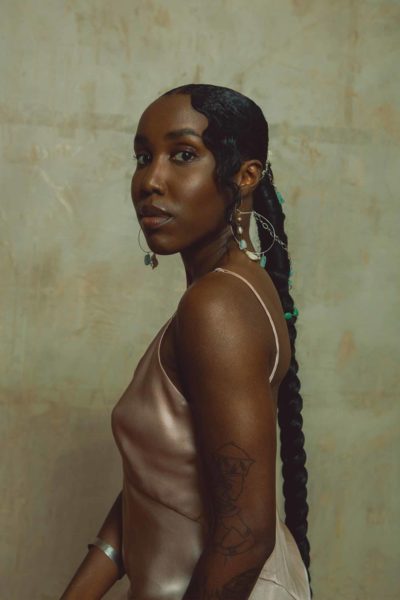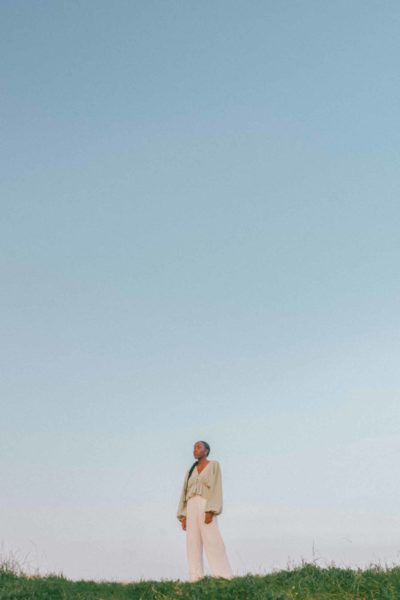- Words Tahirah Thomas
- Photography Keziah Quarcoo
- Photography Jelani Pomell
South London's answer to dazzling future-jazz, Ego Ella May, is back and gently ushering us all into her next musical chapter with the arrival of ‘Fieldnotes’, an EP forged in the “perplexing environments caused by lockdown”.
Re-asserting her artistic prowess following the success of her MOBO-Award winning debut LP “Honey For Wounds” – an album conceptualized around the healing power of music -, May’s signature heartfelt and honest lyrical sensibilities shine through on this 4-track inquiry into physical and emotional solitude.
Boasting cutting-edge production from the likes of EUN, Geo Jordan and L.A.’s ethereal FLWR CHYLD, the sonic landscapes presented on this new project provides the perfect plane for May’s synoptic observations of self-imposed pressure, gratitude, and temporary escapisms.
In the nail-biting lead-up to this spontaneous release from the singer, writer Tahirah Thomas catches up with May on the end side of a global pandemic and career-defining album release, to discuss how the unprecedented events of the past year became the impetus for this whimsical tangent of musical exploration.

What’s up, Ego! The last time we spoke was the day before you released ‘Honey For Wounds’. Watching that record grow and touch peoples’ lives was nothing short of awe-inspiring. How has the past year and a half been for you?
I can’t believe it’s been a year and a half already! It feels weird; like my perception of time has been warped slightly by the pandemic. I released that album with no expectations. I didn’t know what was going to happen, but I didn’t want to hold onto it for much longer, so it almost felt like I was releasing it on a whim. Thankfully, it did better than I ever thought it would. I don’t know if that’s me being too precious about my music, too apprehensive as always; but the reaction to ‘Honey For Wounds’ came as a big surprise. I feel really grateful that people are receiving my music well. If I’m honest, it makes me a little scared to release this next project; I don’t want people to compare the two, you know?
Do you feel like that’s an added pressure?
Yeah. I just feel like that’s the way it’s going to go in my head now anyway. I’ve found myself having to re-affirm that everything’s going to be fine way more often leading up to this release for sure!
If it’s any consolation I don’t think you’re capable of making a bad song; I wouldn’t stress it too much! I want to know, have you had any profound shifts in musical perspective in the time spent between recording the two projects?
I think for the most part I’ve stuck with what’s familiar, in the sense that I feel like I have an idea of what works for me now. Naturally, I worked with EUN (pronounced like Ian), who produced on “Girls Don’t Always Sing About Boys”, “Give A Little” and “Songs For Bobby” from the last album. On the not so familiar, this time around I’ve tried to expand my reach when it comes to the collaboration side of things. I got the chance to work with FLWR CHYLD, who I’m pretty obsessed with musically. I’m still in shock that we were able to work together and more excited that he’s featured on what’s now my favourite song on the project. I also worked with Geo Jordan for the first time; he’s this unbelievable multi-instrumentalist, he’s everything actually – the main takeaway from those studio sessions was how much fun and laughter they involved. So, I feel like I’ve been in my comfort zone, but I also haven’t – if that makes sense?

It does! You must have had a lot of Zoom studio sessions though, right?
Yeah. I didn’t tend to like those. Sometimes the sound would be lagging behind by a few seconds for entire sessions, which made it impossible to get stuff done. So, a lot of the time we’d send sounds back and forth through e-mail; it just worked better that way. After some trial and error, we ended up finding a good balance until we were able to meet up in person after the lockdowns. I’m an artist who can appreciate solitude when I’m creating sometimes too, so I still had that, but I was so happy to be able to build those connections with the select few people I worked with on the project whilst staying connected with the music at the same time.
One thing that always strikes me about the way you sing, is how your voice carries its own vibration outside of any instrumentation on tracks. Your hooks often feel like mantras. Are you someone who uses mantras in your daily life?
It’s crazy that you picked up on that because I do 1000% use mantras in my daily life. I don’t remember when I started using them, but I used to go to these meditation classes where they taught us how there’s a science behind mantras that connects the mind and the body. I guess I’ve been using them for so long that they’ve shown up in my music as this unconscious thing. Seriously, I didn’t even consider it until you said that; but you’re spot on!
It’s a novelty of yours’ for sure! Also, the words you use to articulate artistic meaning are always so well thought out. I love the title ‘Fieldnotes’ for this new project; can you explain why you named it that?
Fieldnotes are what scientists and researchers use to record what they observe in a non-obtrusive manner; meaning without interfering with the facts or data. I started writing this project as a response to the confusion I felt as a result of the pandemic. It was during that weird time in the first lockdown when everyone was making unnecessary amounts of banana bread and encouraging each other to delve into self-help books and be super productive. I remember just feeling the complete opposite of that! I found myself asking, “What’s the meaning of all of this”!? I felt like the narrative was very much, “make the most of this time” and I for one, was not thinking about doing any of that shit! I just wanted to relax, centre myself and breathe. So, I sort of delved into my own private little musical research project, where I started to observe the state of the world in contrast with how people were coping with isolation, whilst I was also still in a state of confusion myself. I continued to observe and write down all my reservations about how lockdown was affecting me and how I felt it was turning us all insane. So, yeah! Basically, those thoughts became my fieldnotes and eventually formed the EP and informed the title.
That’s genius! What were the most comfortable and uncomfortable things you observed about yourself whilst in that involuntary, prolonged solitude?
I’m quite introverted. I’d spent so much time before the pandemic trying not to be that way and when the lockdowns happened, I was actually grateful that I felt so comfortable being on my own for once. I was able to accept and embrace that aspect of myself fully. One thing I observed that took me by surprise, was that there was a situation where I realised that I wasn’t quite as accepting and understanding of others as I thought I was; that I could be quite judgemental. I’m glad I had that realisation then though, because I was able to address it and change for the better, you know? There’s a track on the EP called “Yoyo” where I unpack that observation a little more.

I know you love to read; I’d imagine you must have done a lot of reading over the time in lockdown. Do you have any standout books, poems, or texts that informed any of the songs on this project?
Absolutely! There are two books that come to mind. One is a collection of passages by an American- Tibetan Buddhist named Pema Chödrön, it’s called Comfortable with uncertainty; each text is written with the intention of inducing a state of calm and it works! Those passages informed some of the songs on Fieldnotes in a more thematic sense. Then, I read this novel by Yaa Gyasi called Transcendent Kingdom and, outside of the story of the book, I just love the way she writes and uses certain words to form meaning – she’s so descriptive. In a way, I tried to emulate some of her literary techniques within my own songwriting on this project. Novels are such a useful tool for me as a songwriter because ultimately when you write a song, you’re telling a story – I think that’s why I read so much. I don’t even know who said this, it might have been Stephen King, but one of my favourite quotes is that “you have to read to write”– I think that’s so true!
I feel as though you don’t make songs for projects. That doesn’t seem to be how you work as an artist; which makes sense because jazz music is about being free-spirited and spontaneous after all. What made you decide to group these four songs and release them together?
I think these songs all just flow together pretty well; I suppose they all kind of fit together in my mind. Also, it’s been a while since I released something so I thought, let’s just do it! I didn’t want to hold onto these songs any longer. I feel like if I did, that pressure would slowly start creeping in again. It made sense and I didn’t want to overthink it at all.
Oh absolutely. If it feels right don’t hold back! You’ve expressed that you want people to see themselves in these songs. In closing, can you describe the song that you think people will see themselves the most in?
I hope that people will see themselves the most in “Speck Of Dust” with FLWR CHYLD. I’m really hoping that people connect with the underlying message of that song, because on the surface it may come across as a little pessimistic. On that song, I’m exploring the idea that sometimes it’s okay to take a step back and recognise how insignificant we all are; that our problems and frustrations aren’t the biggest thing going on in the world at any given moment. Of course, the things we all feel on an individual level are super valid, but I’m hoping that people see the positive meaning behind the lyric “I’m just a speck of dust/I mean nothing” because it was written from a really positive place; from a more spiritual perspective. I hope when people listen to that song, they’ll feel a little less heavy. I think we all need some release and relaxation right now and that’s really the foundational idea behind most of these songs, so, I hope people see parts of themselves in all of them to be honest!

